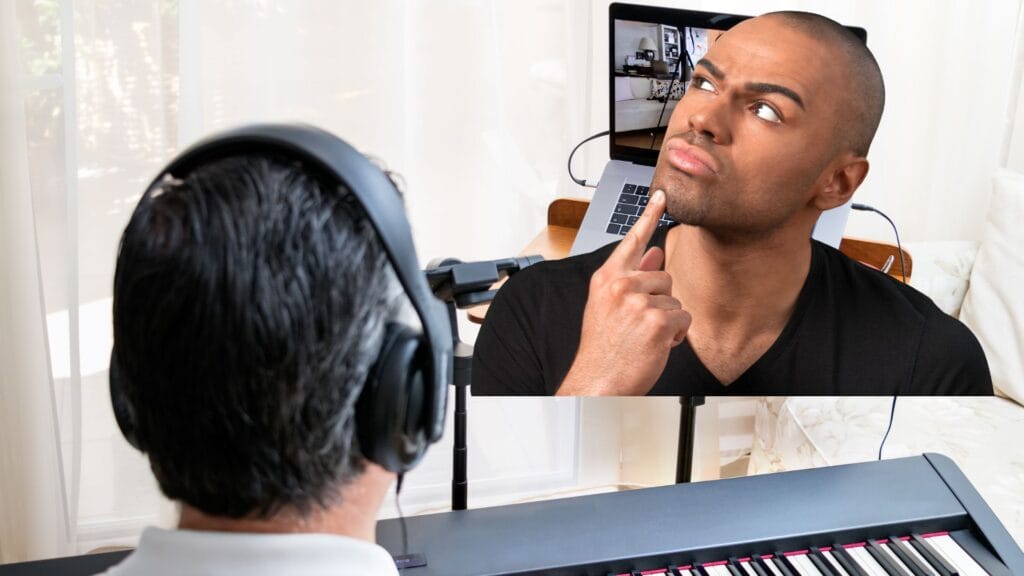What was once the preserve of church halls and chalky-fingered teachers is now a slick, digitised experience. But can live online piano lessons really deliver the same musical magic as in-person ones? Are online piano lessons effective? Spoiler alert: yes — and sometimes, they do even more.
Let’s hit play and unpack the research, the rhythm, and the reality.
🎹 Why Online Piano Lessons Are No Longer Plan B
This isn’t just about watching YouTube tutorials at 2am in your pyjamas. We’re talking live, interactive, one-to-one sessions with qualified teachers who could be halfway across the globe — and, crucially, in your living room via your laptop.
And the results? Surprisingly stellar.
🧠 The Science Backs It Up
That’s not an outlier. A 2025 study into beginner-level online piano courses reported that students showed significant progress in everything from basic finger technique to mastering complex rhythms and chords. We’re talking real, measurable musical growth — even from scratch.
✨ The Major Advantages of Live Online Piano Lessons
1. Access to World-Class Teaching — Without the Commute
You no longer have to live in London to study with a Royal Academy grad or trek across town to find a half-decent teacher. Online lessons eliminate geography. You want a teacher who specialises in jazz improvisation and lives in New York? Sorted. Prefer someone with a flair for Debussy who lives in Edinburgh? No problem.
Online teaching democratises access to top-tier instruction — and that’s a game-changer.
2. More Time on the Keys, Less Time in the Car
With traditional lessons, there’s the hustle of packing up, travelling, and settling in. Online, you’re already at your piano. That extra time? It adds up. Students get more focused instruction time and can dive straight into their pieces, with zero transition faff.
3. Flexible, Student-Centred Learning
Online lessons put power back into the hands of the learner. Want a 9pm session? Fancy learning from bed (not recommended — posture matters)? It’s all more doable. Scheduling becomes fluid, adapting to your life rather than shoehorning music into an already-packed diary.
For adults with jobs, parents with chaotic evenings, or teens juggling school and sports, this flexibility makes consistent practice and progress more likely.
4. Tailored Tech = Turbocharged Teaching
The best live online lessons don’t just replicate in-person experiences — they enhance them. Think:
High-quality video for technique demos
Real-time screen sharing of annotated scores
Recording functions for playback and review
Digital practice logs and personalised lesson notes.
5. Learning in Your Own Space
There’s something psychologically comforting about learning at home. Just your piano, your pace, and your safe space. For anxious learners — especially adults or those returning to piano after a long hiatus — this familiarity can massively boost confidence.
And let’s be honest: you’re more likely to practise when you don’t associate the piano with a weekly rush-hour stress session.
6. Affordability Without Sacrificing Quality
Without the costs of room rentals, transport or long commutes, online lessons can often come at a lower price point — or allow teachers to offer better rates for high-quality tuition. This accessibility makes it easier for more people to stick with lessons long-term — the secret sauce to actually getting good.
7. Global Musical Exposure
Live online lessons don’t just open up teacher options — they open up musical perspectives. A student in Madrid might learn Brazilian bossa nova from a teacher in São Paulo. Someone in Surrey could explore Japanese repertoire with a teacher based in Tokyo. That kind of musical cross-pollination simply wasn’t possible before. It’s a passport to pianistic discovery.
8. Parent Visibility and Involvement
For younger learners, online lessons let parents stay in the loop. No more mysterious comments scribbled in a notebook. Mum or Dad can hear what’s being taught, observe progress, and help with practice. It’s collaboration, not confusion.

🎵 Not Just Effective — Sometimes More Effective
⏱️ Encourages Independence
When you’re not relying on your teacher to physically fix your hand or mark your score, you become more self-aware. You learn to listen more deeply, to assess your own playing critically. And that’s the mark of a true musician.
📅 Regular, Convenient Scheduling
When lessons are easier to book and reschedule, you’re more likely to stick to them. Regularity matters more than frequency. And consistency breeds confidence — and skill.
📈 Measurable Progress
With exams such as the ABRSM performance grades, students can work towards an achievable goal within a time span that suits them.
💡 What Makes a Live Online Piano Lesson Truly Work?
Not all online lessons are created equal. The best setups have these in common:
Experienced, adaptable teachers who understand how to tailor their method for a digital space
Reliable tech — good camera, mic, lighting, and stable internet
Structured lessons that combine technical work, repertoire, and creative play
Student engagement — the more invested and curious the student, the more they’ll thrive
When those stars align, you’ve got a lesson that doesn’t just work online — it thrives there.
🔧 Best Practices for Students (That Actually Work)
Set up your space: angle your camera to show hands, keyboard, and posture
Use headphones for clearer audio (both ways)
Record sessions or segments for review
Communicate: tell your teacher what’s working, what’s confusing, what you’re loving
Practise little and often — online or off, there’s no substitute
🏁 Final Cadence: Should You Go Online?
Live online lessons offer a powerful, flexible, and often more personalised way to learn piano. They work best when led by passionate teachers who embrace the medium, and by students who show up with curiosity, commitment and a decent webcam.
So whether you’re a total beginner with a digital keyboard and a dream, or a returning pianist with some Chopin under your fingers — don’t be afraid to click ‘Join Meeting’. The music is waiting.
🎹 Curious if online lessons really deliver? Book a free consultation and see how personalised, expert guidance can make all the difference—right from your own home.
Interested in online piano lessons?
❓Q&A: Your Burning Questions About Online Piano Lessons, Answered
1. Do online piano lessons really work for absolute beginners?
With live, one-to-one instruction and a supportive teacher, students can build rock-solid foundations, sometimes progressing faster than in traditional settings. Add in video replays and digital tools, and you’ve got a setup that’s seriously effective.
2. Isn’t it harder for teachers to correct technique over video?
Not necessarily. While you lose the hands-on element, good teachers get creative. They’ll use multiple camera angles, ask students to send video clips between lessons, and provide ultra-clear demonstrations. The upside? Students become more self-aware, tuning into their body mechanics and sound more than they might in person — and that’s a powerful thing.
3. What kind of setup do I need at home?
You don’t need Abbey Road Studios. A stable internet connection, a laptop or tablet with a camera, and a piano or keyboard are your basics. Position the camera so your teacher can see your hands and posture. Headphones help with audio clarity, and an external mic can give your sound a major boost — but they’re optional, not essential.
4. How does sound quality compare to in-person lessons?
It depends on your tech. Standard video call platforms compress audio, which can flatten the tone. But many teachers use upgraded software like RockOutLoud or Cleanfeed, which preserves audio detail. Plus, sending video or audio clips between lessons helps fill in any gaps, especially when nuance matters..
5. Are online lessons just for beginners, or do they work for advanced players too?
Online lessons scale beautifully. Advanced students can study with teachers who match their niche — jazz improvisation, classical interpretation, you name it — no matter where they live. Tech tools like annotated scores, slow-motion playback, and real-time critique turn online sessions into a dynamic masterclass, not a compromise.

















